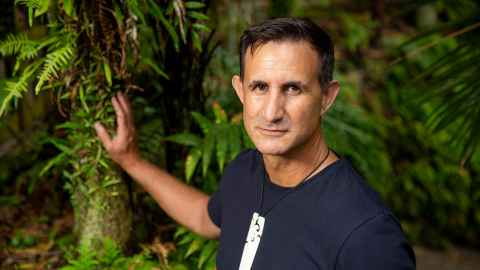The role of Indigenous knowledge for public health
13 October 2025
Associate Professor Dan Hikuroa championed te ao Māori at a national public health meeting.

The power of Indigenous knowledge was a key focus at the New Zealand College of Public Health Medicine (NZCPHM) annual scientific meeting, Hui Pūtaiao a-tau, held in Rotorua last month.
Public health leaders, researchers and practitioners explored the theme:
Public health leadership in changing times: turning insights into action | Me huri ake te tirohanga kia ākina ki te anamata, with sessions ranging from rangatiratanga (leadership and traditional healing) to taiao (leadership grounded in the natural world).
Among the University of Auckland academics invited to present was Māori Studies Associate Professor Dan Hikuroa (Ngāti Maniapoto, Waikato-Tainui, Ngaati Whanaunga, Pākehā).
He described the gathering on 17 and 18 September, as an invaluable opportunity to introduce Indigenous knowledge to professionals working in the public health space, highlighting te ao Māori as a framework for achieving mauri ora (holistic wellbeing).
“This is a group of learned professionals that many of us trust implicitly,” said Hikuroa. “To see them place so much importance on Indigenous knowledge - on how we frame our approach and use knowledge that is both accurate and precise- is truly heartening.”
When we care for the land, the land cares for us
His presentation, Being a good ancestor – expressing our taiao relationships, invited attendees to consider how ancestral wisdom and environmental stewardship can guide public health leadership in times of change.
“Being a good ancestor is not just a metaphor—it’s a responsibility,” he said. “It means making decisions today that honour our whakapapa, protect the mauri of the taiao, and ensure the wellbeing of generations yet to come.”
Hikuroa emphasised that taiao, the natural world and its interconnected systems, is not separate from humanity, but deeply entwined with it through whakapapa.
“We are not above nature, nor outside of it. We are part of it. Our ancestors understood this, and our descendants will depend on us remembering it.”
Kaitiakitanga as a public health imperative.
He described kaitiakitanga, guardianship of the environment, as a public health imperative.
“When we care for the land, the land cares for us. The health of our waterways, our forests, our soil—these are not just ecological concerns, they are public health concerns. The mauri of the taiao is directly linked to our own mauri ora.”
Hikuroa urged public health professionals to embrace mātauranga Māori (Māori knowledge) not as an adjunct to Western science, but as a complementary and equally valid system of understanding.
“Indigenous knowledge is not anecdotal - it is empirical, tested over generations. It offers precision, depth and a relational lens that Western frameworks often lack.”
Living the legacy
He challenged his peers to reflect on their roles as ancestors-in-the-making -
“Every policy, every intervention, every decision we make in public health must ask: is this tika? Is this just and fair for those who come after us?”
Guiding principles such as manaakitanga (care and respect), whanaungatanga (relationships), and tika (justice), he said, should underpin leadership.
“Leadership is not about control - it’s about connection. It’s about listening to the land, to the people, and to the stories that shape us.”
A turning point for public health
NZCPHM President Professor Sir Collin Tukuitonga said the annual meeting’s theme was timely and relevant, especially as the sector grapples with climate change, inequity and systemic transformation.
“This was a great opportunity for our members to reflect on public health leadership in the current context," Tukuitonga said.